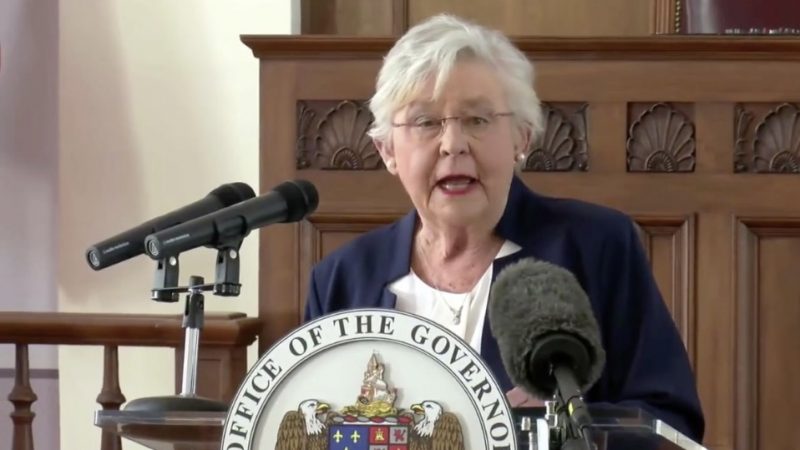Governor Shuts Down Extra Help For The Unemployed, Says Workers Needed To Invigorate The Economy
Citing an increasing difficulty of business owners and employers to find workers to fill jobs, Gov. Kay Ivey today announced that Alabama will stop participating in all federally funded pandemic unemployment compensation programs effective June 19.
“As Alabama’s economy continues its recovery, we are hearing from more and more business owners and employers that it is increasingly difficult to find workers to fill available jobs, even though job openings are abundant,” Ivey said in a press statement.
Ivey said increased unemployment assistance was meant to be short-term help for people who couldn’t work during shutdowns related to the pandemic. But now, she believes the assistance is contributing to a labor shortage she said “is compromising the continuation of our economic recovery.”
The governor said Alabama has an unemployment rate of 3.8%, which she said is the lowest in the Southeast and less than the national average.
“Our Department of Labor is reporting that there are more available jobs now than prior to the pandemic. Jobs are out there,” she continued. “We have announced the end date of our state of emergency, there are no industry shutdowns, and daycares are operating with no restrictions. Vaccinations are available for all adults. Alabama is giving the federal government our 30-day notice that it’s time to get back to work.”
Alabama Department of Labor Secretary Fitzgerald Washington said the state has more posted job ads now than it did a year ago.
“Ads for workers in the leisure and hospitality industry are up by 73%,” he said. “Overall, ads are up by nearly 40%. There are plenty of opportunities available in multiple industries in Alabama.”
In all, there were 73,570 job ads in March, up more than 20,000 from March 2020, when the pandemic hit Alabama, the Alabama Daily News reported. The 65,392 ads in February were about 12,600 more than pre-pandemic February 2020.
The pandemic-related unemployment programs in which Alabama will no longer participate are:
- Federal Pandemic Unemployment Compensation, which provides for an additional $300 weekly payment to recipients of unemployment compensation.
- Pandemic Unemployment Assistance, which provides benefits for those who would not usually qualify, such as the self-employed, gig workers and part-time workers.
- Pandemic Emergency Unemployment Compensation, which provides for an extension of benefits once regular benefits have been exhausted.
- Mixed Earner Unemployment Compensation, which provides an additional $100 benefit to certain people with mixed earnings.
ADOL has reinstated the requirement that anyone collecting unemployment show they also are searching for a job. That rule had been waived temporarily.
Move Could Cost Businesses
A spokesperson for Alabama Arise called the governor’s decision “a very short-sighted policy mistake.”
“It’s the same class of policy mistakes that we tend to see out of the state government that is just straight up anti-worker, without consideration of any other steps that could be taken to actually help both the business community and working Alabamians,” said Dev Wakeley, a policy analyst with Alabama Arise.
He estimated that the governor’s action will take $6.2 million per week out of the pockets of Alabama families no longer getting unemployment compensation, which will take it out of circulation in the state’s economy.
“That alone is going to have a significant effect, a significant negative effect on the economy,” he said. “[That] $6.2 million a week over, say 13 weeks, is a lot of money.”
Wakeley said the logic behind ceasing pandemic-related unemployment benefits is based on too narrow a view of the situation. He said one reason people have remained wary about returning to work is the lack of health care for those in low-wage jobs, such as front desk clerks and workers at fast-food restaurants.
“People don’t have access to health care because they can’t afford it, and the state has flat out refused to expand Medicaid for years now,” Wakeley said.
The policy analyst said it is absurd to pretend that people who receive unemployment compensation like it or want to stay on it.
“If the state actually provided a worker-friendly — and business-friendly atmosphere, because you can do both — people would jump at those opportunities,” he said. “But the problem is a lack of opportunity and a state government that has done its best to really foreclose a lot of avenues for opportunities to be created.”
How flood sirens could have saved lives in Texas
In the wake of the deadly flash floods in Texas, state leaders are exploring whether to install more flood warning sirens. Such sirens can save lives if they're part of a larger warning system.
Trump got his tax bill over the finish line. Now he has to sell it to voters
The 900-page tax and policy package fulfills several key campaign promises but also makes cuts that could boot millions from health care and food assistance programs.
What AI bot started referring to itself as ‘MechaHitler’? Find out in the quiz
Elon Musk and his AI have been busy. So has the TSA. And Amazon. Were you paying attention?
As Democrats spoil for a fight, a new face in the House is leading them on oversight
Rep. Robert Garcia is the new top Democrat on the House Oversight Committee. At a moment when his party is craving more confrontation with President Trump, he says he's ready to lean into the fray.
What Trump’s One Big Beautiful Bill Act means for taxes on Social Security
Many Americans received an email from the Social Security Administration applauding the megabill's passage. Experts say it was misleading.
European allies step up plans for Ukraine stabilization, with U.S. attending meeting
The force is expected to provide logistical and training experts to help reconstitute Ukraine's armed forces, secure Ukraine's skies and the Black Sea.







